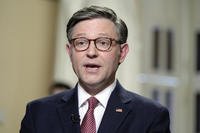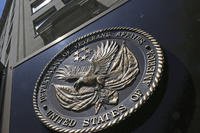SIMI VALLEY, Calif. -- This week, lawmakers are expected to reveal how the U.S. Space Force will be organized, according to two House members.
During a panel discussion here at the annual Reagan National Defense Forum, Rep. Mike Rogers, R-Alabama, said the House and Senate compromise fiscal 2020 National Defense Authorization Act will be finalized Monday, and lawmakers are expected to vote on the legislation Wednesday.
"I've been glowing for the past day," Rogers said Saturday when asked if he was satisfied with the language about space.
Rogers originally created legislation in the fiscal 2018 NDAA that would have required the Air Force to stand up an internal "U.S. Space Corps" in hopes of taking adversarial threats in space more seriously.
Related: Space Force Funding May Come Up Short This Year, Key Lawmaker Says
That effort hit a roadblock months later and was ultimately dropped, only for the idea to be resurrected later by President Donald Trump, who called for a Space Force to be the sixth branch of the military.
"You'll see the details when they come out, but we worked in a bipartisan way to try to keep that stuff under control and not just give a blank check out there to go create another institution," chairman of the House Armed Services Committee Rep. Adam Smith, D-Wash., told reporters following the panel. "It's been agreed upon for a couple of months as far as the structure."
Smith said he'll be monitoring its creation.
"The biggest concern is maximizing efficiency, minimize the amount of money spent. We don't need to create a whole bunch of more positions. It's really more a matter of realigning the priorities. It's not a matter of creating another big bureaucracy," he said.
During the panel, Barbara Barrett, the newly-minted Air Force Secretary, said a Space Force is necessary in order to deal with future threats.
But could the mission evolve?
In the discussion, the secretary was asked: "Should the [mission] focus be to defend assets in space ensuring if [humans] do want to travel to the moon or to Mars the [Space Force] mission establishes a clear path to do that, or should the mission be to enable warfighters terrestrially?"
"It's absolutely both," Barrett replied. "We have to be able to defend what we have there that we count on, we have to replace [systems] that require external defense ... we need to then be able to use space as an enabler for our warfighters in other domains."
Additionally, the panelists, who included Tory Bruno, the president and CEO of United Launch Alliance, discussed how commerce in space is expected to grow.
"Space is an opportunity for [our adversaries] to level the playing field," Bruno said. "What is new is that they are prepared now to take that warfare to space and we will have to actively defend our assets in orbit. But .. there will be substantial commercial activities in space. And we will also be asked to ensure the freedom of that commerce."
-- Oriana Pawlyk can be reached at oriana.pawlyk@military.com. Follow her on Twitter at @oriana0214.
Read more: Aging B-1 Bomber May Soon Have to Restrict the Way it Flies












